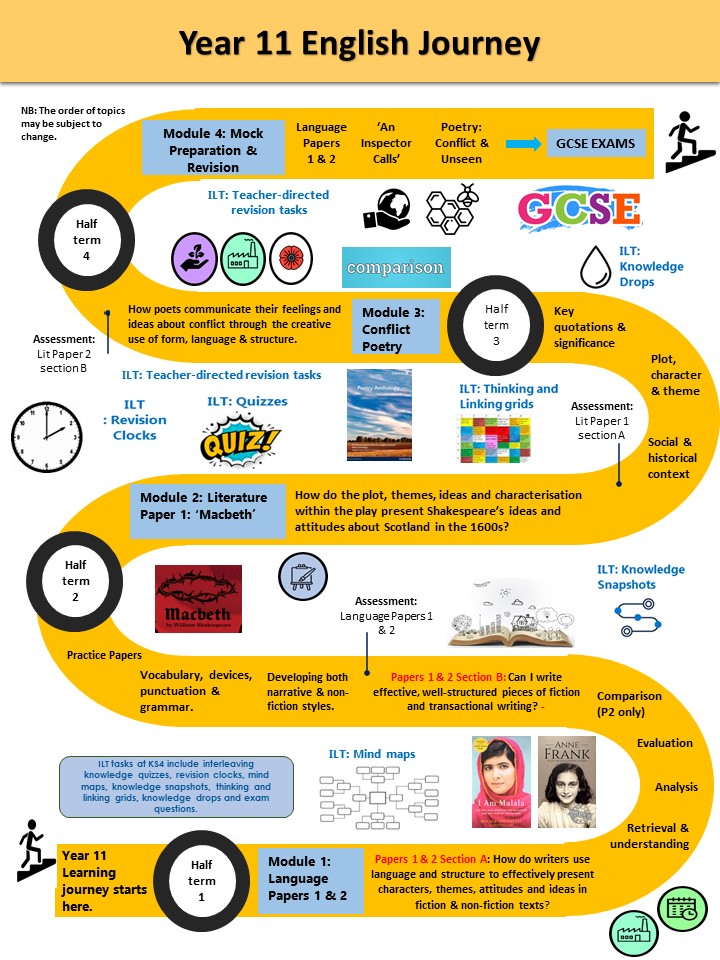English
Why do we study English?
The magic of studying English is that we are free to escape reality and become immersed in fascinating fictional worlds, be captivated and inspired by gritty non-fiction texts and above all develop a love of the English language.
Teaching English is a passion for the members of our English department and we strongly believe that it is a vital component to learning, providing children with fundamental skills that will aid their whole school progression. Therefore, it is paramount that their English education is rich and creative to ensure engagement.
We aim for students to develop proficient communication skills through reading, writing and oracy, ensuring that they can express themselves thoughtfully and assuredly. They are given boundless opportunities to exercise these skills by exploring a wide range of literature texts to broaden their knowledge of other eras and how the English language has developed over time.
In order for students to be successful in English, it is vital that they enjoy their learning. Therefore, we pride ourselves on delivering exciting, thought-provoking and stimulating lessons that ignite our students’ desires to thrive. Success is attainable for all of our students as we endeavour to challenge and support in our inclusive curriculum.
Below is a comprehensive guide to the programmes of study that we deliver:
Year 7
Learning Outcomes
Reading:
• Understanding implicit information and ideas.
• Understanding and identifying language devices.
• Understanding and identifying structural devices.
• Developing evaluation skills.
Writing:
• Developing descriptive detail.
• Developing planning and organisational techniques.
• Improving punctuation and sentence structures.
• Improving vocabulary choices.
Topics Taught
- Origins of Literature
- Inspirational Speakers
- Romeo and Juliet
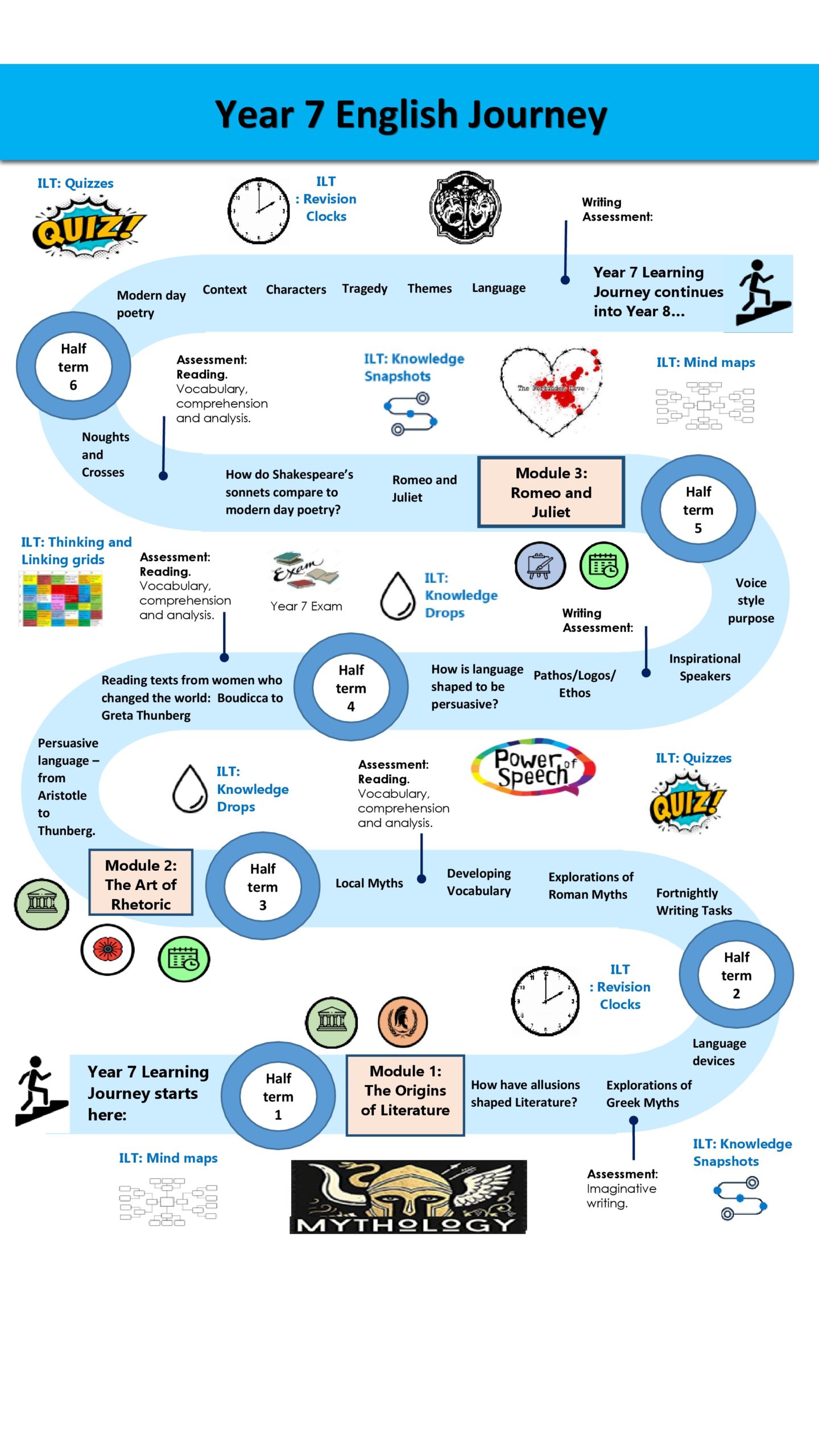
Year 7 Documents (click to download)
Year 8
Learning Outcomes
Reading:
• Increasing interpretations of implicit information/ideas.
• Increasing confidence in identifying a range of language and structural devices.
• Independently analysing language and structure.
• Continuing to develop evaluation skills.
Writing:
• Continuing to develop descriptive detail in a range of genres.
• Increasing confidence in planning and organisational techniques.
• Implementing strategies to develop punctuation.
• Continuing to broaden vocabulary choices.
Topics Taught
- Dystopian Fiction – The Hunger Games
- Travelling through the Ages
- A Midsummer’s Night Dream
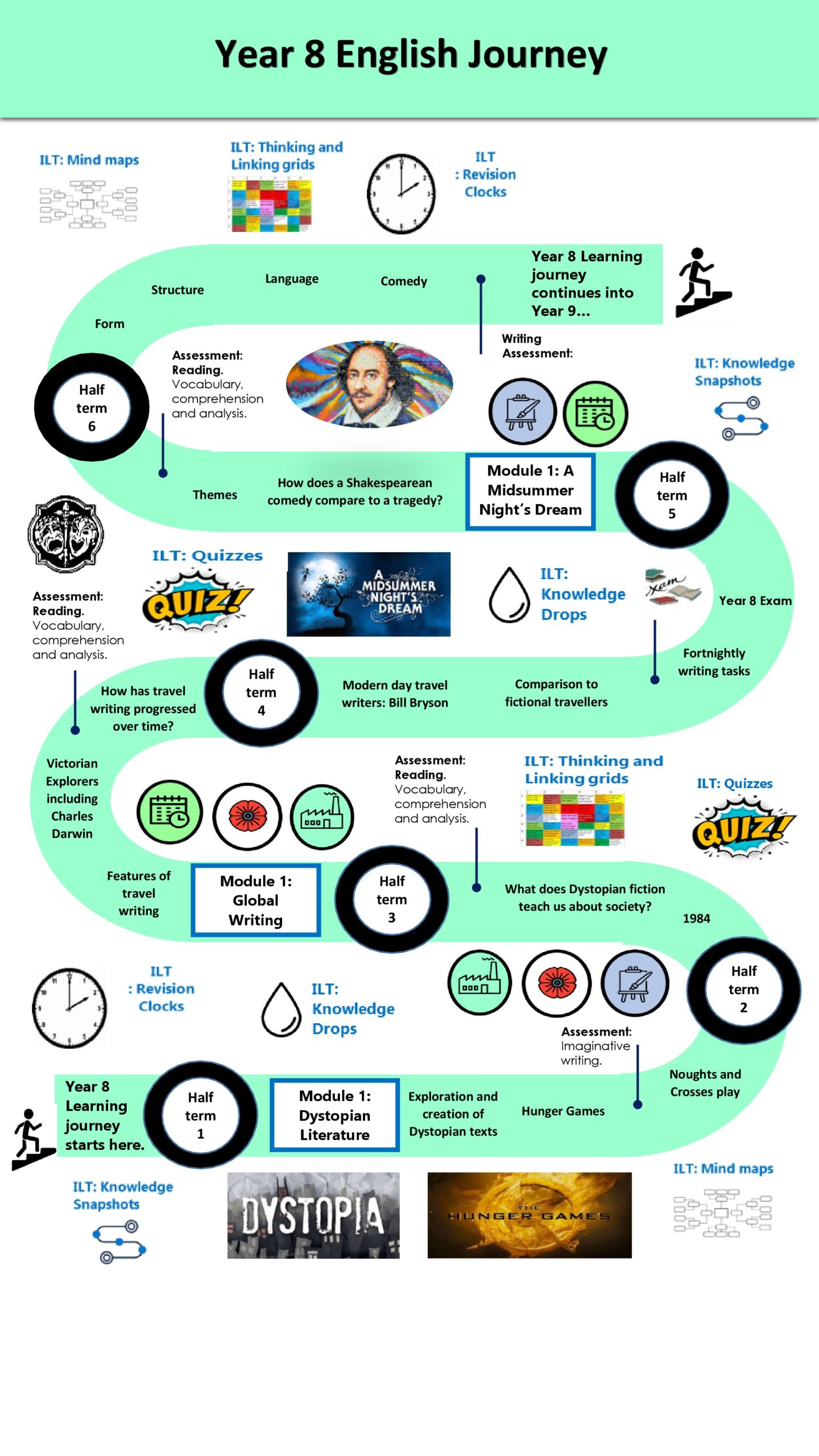
Year 8 Documents (click to download)
Year 9
Learning Outcomes
Reading:
• Assured personal response – high level of engagement.
• A critical/perceptive style is developed.
• Confident strategies for independent responses.
• Independently analysing language and structure.
• Confident and detailed analysis of form.
• Confident understanding of the impact of context.
• Informed and perceptive comparisons/contrasts.
Writing:
• Confident use of tone/style/register in a range of texts.
• Shapes audience’s response with subtlety.
• Confident clarity/purpose/effect in a range of texts.
• Structural and language devices used accurately and selectively.
Topics Taught
- Gothic Fiction – The Woman in Black
- Opposing Forces: The Power of the Media
- Shakespeare’s Heroes and Villains
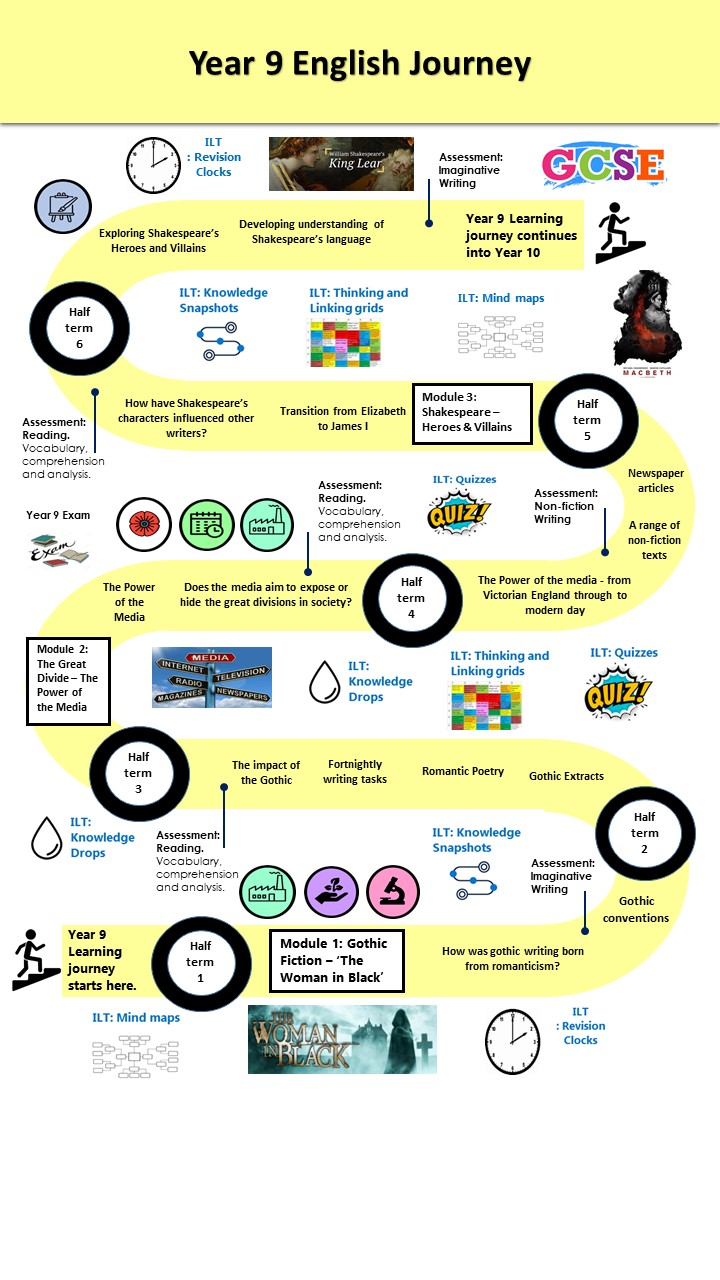
Year 9 Documents (click to download)
Year 10
Exam Specification
GCSE English Language
Edexcel Specification
GCSE English Literature
Edexcel Specification
Learning Outcomes
Reading:
- Shows a perceptive understanding of differences between texts and ideas within texts, and can compare ideas and perspectives in a perceptive way
- Selects a judicious range of quotations from a range of texts
- Shows perceptive analysis of language and structural features
- Uses a range of subject terminology accurately sustained throughout
- Analyses effects of a range of writer’s choices and can critically evaluate the text in a perceptive, sustained way
Writing:
- Communication is convincing throughout
- Tone style and register assuredly matched to purpose, form and audience
- Extensive vocabulary with sustained crafting of linguistic devices
- Highly structured and developed writing, incorporating some complex ideas
- Fluently linked paragraphs
- Varied use of structural features
Topics Taught
Autumn Term
- J.B Priestley: An Inspector Calls
- Language Paper 1: 19th Century Fiction and Imaginative Writing
Spring Term
- Language Paper 2: Non-fiction reading and Transactional Writing
- Spoken Language
Summer Term
- Conflict Poetry
- Key Intervention where required
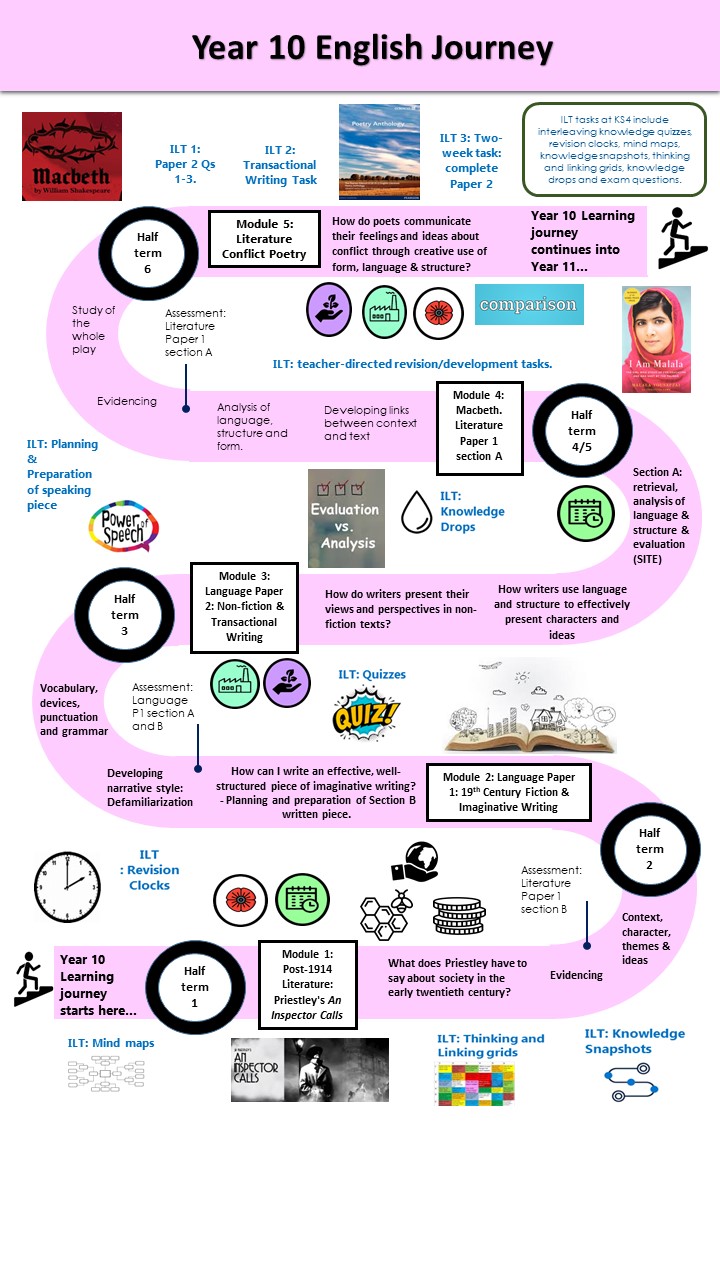
Year 11
Exam Specification
GCSE English Language
Edexcel Specification
GCSE English Literature
Edexcel Specification
Learning Outcomes
Reading:
- Shows a perceptive and convincing understanding of differences between texts and ideas within texts, and can compare ideas and perspectives in a perceptive way
- Selects a judicious range of quotations from a range of texts, making links to each successfully
- Shows perceptive and convincing analysis of language and structural features and explores with confidence
- Uses a range of subject terminology appropriately and convincingly
- Analyses effectively the effects of a range of writer’s choices and can critically evaluate the text in a perceptive, sustained and convincing way
Writing:
- Communication is convincing and compelling throughout
- Tone style and register assuredly matched to purpose, form and audience; manipulative, subtle and increasingly abstract, used with confidence
- Extensive and ambitious vocabulary with sustained crafting of linguistic devices, used with flair
- Highly structured and developed writing, incorporating a range of integrated and complex ideas used with confidence
- Fluently linked paragraphs with seamlessly integrated discourse markers
- Varied and inventive use of structural features
